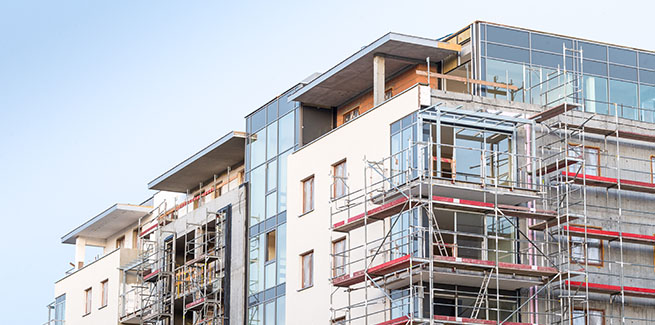The latest data from the Australian Bureau of Statistics (ABS) show that total building approvals moderated in May, growing by a seasonally adjusted 0.7 per cent over the month to 14,436, after two consecutive months of sharp month-on-month declines (13.4 per cent in March and 3.4 per cent in April).
The stabilisation was driven by a rebound in private sector apartment and townhouse approvals, which rose over the month by 1.2 per cent to 5,759 in May, after falling by 5.1 per cent in April.
However, private sector house approvals were down by 0.3 per cent over the month in May.
In the year to May 2019, total building approvals shrunk by 19.6 per cent, according to the ABS, with apartment approvals contracting by 20.1 per cent year-on-year and house approvals by 12.7 per cent year-on-year.
The bureau also noted that the seasonally adjusted estimate of the value of total building approved shrunk by 0.2 per cent in May. The value of residential building increased by 4.7 per cent over the month in May, while the value of non-residential building decreased by 6.7 per cent.
Building approval growth was strongest in Victoria, rising by 14.4 per cent over the month in May. This was driven by a substantial 40.9 per cent month-on-month growth in apartment approvals.
In NSW, growth in total building approvals remained flat due to a modest rise in house approvals that was dragged down by weakness in apartment approvals.
Queensland and South Australia both saw contractions in approvals, by 6.3 per cent and 2.9 per cent over the month, respectively, driven by declines in apartment approvals.
The total fall of 4.7 per cent in building approvals in Western Australia was attributed to weakness in house approvals.
Maree Kilroy, economist at BIS Oxford Economics, said the positive impact of the Reserve Bank of Australia’s two consecutive cash rate cuts won’t be seen in approvals figures for some time.
“Given the long lead times involved between new property sales and actual construction, the positive impact of falling borrowing costs will not materialise in the building approval data until Q1 2020,” Ms Kilroy said, adding that BIS expects another 25-basis-point rate cut by the end of the year.
Conversely, ANZ economists Felicity Emmett and Adelaide Timbrell believe that the record-low 1 per cent cash rate, along with Australian Prudential Regulation Authority’s proposed changes to home loan serviceability, could help boost approvals in upcoming months.
“The signs of green shoots are encouraging, with unit approvals creeping up for the last few months,” they wrote.
“House approvals are down slightly, but the pace of decline is slowing.”
[Related: Pace of property price slump slows to 12-month low]

